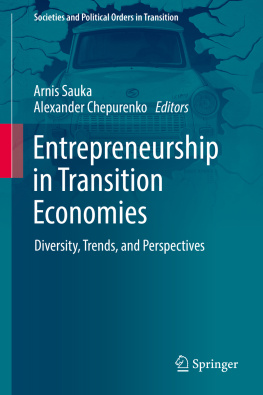The term systemic transition is quite established in the literature on the change of socioeconomic models in a big group of former Socialist countries, mostly in Central and Eastern Europe (CEE) and the Commonwealth of Independent States (CIS). Since the very beginning of the transition, i.e., the collapse of the Soviet Union, it has been assumed that the main direction should be from a planned economy toward a market-oriented economic model. Yet, even during the first decade of transition, it became evident that (1) transition economies cannot be treated as a unified group and that it is important to distinguish between countries at different stages of market reforms and (2) the transition process is not a linear process (Kolodko ). Meanwhile, though there is still no consensus on when and whether the transition is over, there are clear doubts as to whether the assumption with regard to the movement toward a market economy is really valid for all transition countries. Therefore, in the present volume, we use the term transition in quotes to stress our distance from the conventional meaning of this term.
Still, regardless of the direction in which transition countries have chosen to develop, emergence of private sector activity is evident in all of these countries. Especially in the early 1990s, most transition countries exemplified at least some elements of creative destruction of old economic structures and forms of governance. This was, however, inevitably followed by growing bottom-up entrepreneurial activity, which left fingerprints on both the economic and social situation in the region. Yet, the process of entrepreneurship development took place at different speeds and was also of different types in various transition countries (Smallbone and Welter ).
Furthermore, we know from studies exploring entrepreneurship in various transition contexts that, influenced by an institutional framework that is not always properly established, entrepreneurs often followed an unproductive path (Estrin and Mickiewicz ).
In line with the notion that context matters, shaping both the role of entrepreneurship in general and the structure and performance of companies (e.g., Karlsson and Dahlberg ), many researchers have attempted to explore the development patterns of entrepreneurship in various transition countries. Most of this research, however, has focused on single countries and lacks a comparative perspective that would allow for a more in-depth understanding of various development patterns in distinct transition countries. Lately, due to the efforts made by several international research projects, especially the Global Entrepreneurship Monitor (GEM), data enabling researchers to fill in this knowledge gap about entrepreneurial activity in several transitional economies became available.
By now, a fruitful and intensive interconnection between general entrepreneurship theories and exploring transitional societies has been established. On the one hand, various entrepreneurship theories provide a number of useful paradigms, methods, and tools to produce informed research on entrepreneurship and entrepreneurial ecosystems in a transition setting. The paradigm of entrepreneurship as exploration and exploitation of new market opportunities, the idea of microlevel institutions (such as the family or school) and their impact on entrepreneurial performance, the thesis on the different impacts of opportunity vs. necessity motivation on entrepreneurial strategies, and the role of networks in establishing markets for entrepreneurial products are only a few examples.
On the other hand, the experience of researching transitional landscapes enriches entrepreneurship theory with some new insights and evidence. Arguably, among the most important contributions in this regard is the notion of contextualizing entrepreneurship (Welter ), thus making assumptions based on evidence from relatively more established market economies more relevant within the framework of a transition setting often characterized by imperfect markets and competition, unproductive entrepreneurship, and informality. Furthermore, entrepreneurship theory is making progress in developing methods for a cross-country comparison of entrepreneurial ecosystems. Some of the output of this development can also be found in the research on diverging paths of entrepreneurial ecosystems in post-Socialist countries.
All in all, theoretical developments within the entrepreneurship research domain, the availability of cross-country data, and the increasing number of single country studies have generated substantial knowledge on the development of entrepreneurship in transition countries. Yet, entrepreneurship development, especially in a transition setting, which tends to be more dynamic compared to more advanced market economies, needs to be constantly reassessed. In the context of the above discussion, this volume aims to contribute to this debate by providing up-to-date evidence with regard to recent developments: trajectories and specific forms as well as the performance of entrepreneurship in different transitional environments. Given the nature of the transition process, we believe that such evidence could be of use to both academic society engaging in entrepreneurship research and policymakers and international organizations interested in gaining contemporary, nuanced insights into the similarities and differences of entrepreneurship development in CEE and the CIS.
Outline of the Volume
This volume brings together some of the leading scholars engaging in entrepreneurship research within the transition context and consists of six parts:
Part I seeks to provide a more general theoretical explanation of the impact of institutions on the development of entrepreneurial practices in different transitional environments. Part I starts with an introduction, written by the editors of this volume, who discuss the interconnection of the aspects of transition and entrepreneurship theory, and introduces the contributors to the volume. More importantly, however, Part I includes a contribution by Ruta Aidis that attempts to explain the diverging paths of entrepreneurship development in 15 transition countries. Aidiss contribution explores transition processes after the collapse of the Soviet Union within two main country groups: the Baltic countries (Estonia, Latvia, and Lithuania) and the Commonwealth of Independent States (CIS), consisting of nine other former Soviet republics. Entrepreneurship development within these country groups is explored through the lenses of individual cognition, perceptions of institutional arrangements, and attitudes toward entrepreneurship. To do this, Aidis draws on institutional theory and introduces the use of mental models, using inter-CIS migration patterns and media freedom to illustrate how certain types of attitudes toward institutions and weak institutions can impede the development of productive entrepreneurship in a transition setting.




